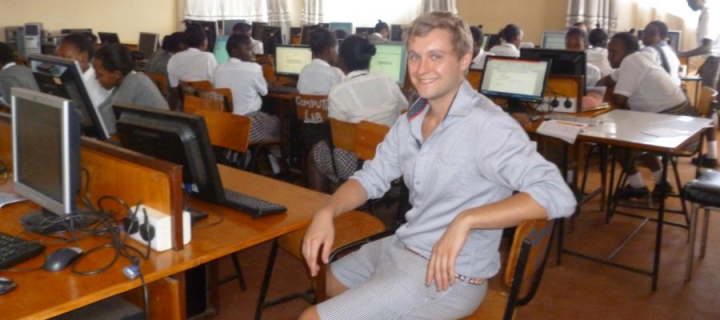In technology we trust
The Turing Trust is transforming classrooms in rural Africa through technology.

Set up by recent graduate and current PhD student, James Turing, the great-nephew of renowned mathematician Alan Turing (1912–1954), the Turing Trust works in Sub-Saharan Africa to provide schools with valuable IT resources and training.
A lasting legacy
While many people are aware of Alan Turing’s incredible code-breaking achievements in World War Two and his later contributions to the development of the first computer, not many realise that he was also a great supporter of education for those in need. Today, James Turing and the Turing Trust are honouring Alan’s name and his philanthropic beliefs though the charity’s work.
James, who gained an MEng (Structural Engineering & Architecture) from the University in 2015 and is currently working towards his PhD in International Development, set up the Turing Trust in 2009 after a trip to Ghana, where he saw first hand the lack of computing facilities available to rural communities.
With a passion for technology and desire to help people, not unlike Alan Turing himself, James set about finding a way to improve the situation. Now, with a team of 100 volunteers, the Trust refurbishes donated computers, installs educational resources on them in Edinburgh, and ships them out for use in schools in Ghana and Malawi. Students and teachers receive both the equipment and essential IT training.
Introducing the Turing Trust
Investing in the future

Here James writes about about the charity’s aims and latest developments:
It’s hard to believe but, according to UNESCO, only 2 per cent of schools in Malawi have computers. The Turing Trust is trying to address that.
Last year, we sent our first shipment of 600 computers to schools in Malawi. We worked hard to get the donated computers refurbished, ready for people in these communities to access the knowledge and opportunities of the digital world for the first time. An incredible 1,702 PCs were donated in 2016 – an increase of 54 per cent on the previous year.
There are challenges, of course. Malawi is landlocked, which makes shipping computers in containers extremely expensive. The cost of getting PCs to the classroom has risen from an average of £8.22 for Ghana to £13.87 per PC to Malawi. With expansion into new territories come new fundraising dilemmas.
I support and develop the work of the Turing Trust whilst also conducting fieldwork for my PhD in Nairobi. I am researching the circular economy in Nairobi under the University’s School of Social and Political Science, with additional support from the Business School. It’s a daily balancing act – particularly with a patchy Wi-Fi connection – but it’s been vital to equip me with insights and expertise to support the growth of the Trust.
Improving prospects
It is the greatest feeling to see it all pay off. In these rural communities, subsistence-farming parents are realising the value of digital skills for their children.
We’re now in a position to help local governments achieve their own goals in this area. In Ghana we’ve worked with the Integrated Community Centres for Employable Skills (ICCES) to support the installation of 37 computer labs across the country. These centres are key to mitigating youth unemployment and rural-urban drift. They support the development of micro and small enterprises too.
Our latest shipment to Ghana arrived in Kumasi last week and we already have seven further computer lab installations in ICCES planned and requests for computer labs from primary and Junior High Schools are running at about five per month.
Looking ahead to the future, we’re planning to grow our capabilities beyond an operation based on volunteers alone and to ensure that everything we do in the UK and in Africa is sustainable. Last year we took on our first two members of staff, to focus on programme management and fundraising.
Introducing Turing Talks
We’ve also started Turing Talks, which kicks off with a one-day conference on 13 June at the National Museum of Scotland in Edinburgh. The event will explore innovations and advances being made in technology and how these can be applied in developing nations.
The day will bring together passionate technology and international development professionals with speakers from IBM, Microsoft, Barclays, the European Space Agency, to mention just a few. Our inspirational lineup of speakers will share how their work can disrupt traditional approaches to development and make a significant impact.
Not only will the Turing Talks be a fantastic event that brings together individuals keen to learn about how technology can benefit health, education, energy and finance, but it will also help us continue our far-reaching work in sub-Saharan Africa.
This is only the beginning and yet in 2009 we couldn’t have dreamed of what we’ve achieved already. As my great uncle Alan once said, ‘We can only see a short distance ahead, but we can see plenty there that needs to be done.’ I couldn’t agree more.
Find out more
If you are interested in the work of the Turing Trust and Turing Talks, visit their website.

